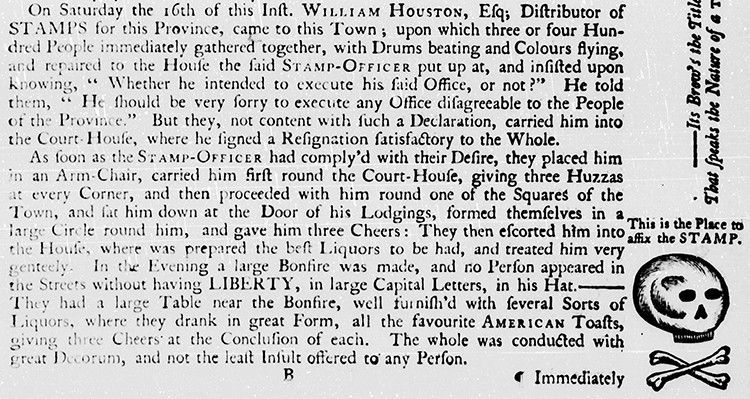D. Ca. 1795
William Houston, Sr., was a physician, apothecary, and local political leader of Duplin County. His early life is obscure until he arrived in North Carolina about 1735 from County Antrim, Northern Ireland. Houston was the nephew of Henry McCulloch, a wealthy London merchant who financed many colonizing expeditions to the Cape Fear region, and served as his uncle's partner, trustee, and agent. In 1742 he built a home, Soracte, on the Northeast River, eight miles from Kenansville.
In 1749, when Duplin County was formed, Houston was an integral part of its development. He was a vestryman of St. Gabriel Parish (Anglican); a justice of the peace, serving frequently from the 1750s onward; Duplin's first representative to the colonial Assembly, from 1749 to 1762; and one of the three men in charge of building the county's courthouse, prison, and stocks. In the Assembly he developed a reputation for industry in the service of his county.
In 1765, after Parliament passed the Stamp Act, Houston was appointed stamp distributor for North Carolina. As he never solicited the office, it is conjectured that he was selected because of his kinship and close relationship with Henry McCulloch. This appointment became the focal point of public demonstrations on 19 and 31 Oct. 1765 in Wilmington, and on 31 October in New Bern and Fayetteville. Houston was hanged in effigy, presumably more in protest against the Stamp Act than against him personally. Unaware of the appointment or the reaction to it, Houston traveled from Soracte to Wilmington on Saturday, 16 November, where he was confronted by a crowd of three or four hundred people led by Colonel John Ashe. Under the circumstances, Houston declared that "he should be very sorry to execute any Office disagreeable to the People of the Province." The crowd was not satisfied until it had escorted him to the courthouse where he put his resignation in writing.
In 1766 Houston became clerk for the Committee of Public Claims at New Bern, and in 1768 and 1771 he was reappointed justice of the peace for Duplin. During the Revolutionary War, he served as chairman of the Court Martial Committee in Duplin, charged with hunting down Tories and deserters to the colonial cause. In 1784, Governor Alexander Martin once again appointed him justice of the peace for Duplin. He served as chairman of the county court from 1784 to 21 Oct. 1793, when he was last mentioned in the court minutes.

Houston was wealthy and owned several large tracts of land and enslaved a number of people to work his property. In 1786, he donated land for a county seat to be built at Soracte, but Kenansville was later chosen instead. Houston married Ann Jones, the daughter of Squire Griffith Jones of Bladen County. They had five children: William, Jr., Edward, Griffith, Henry, and a daughter who married Captain William Hubbard.